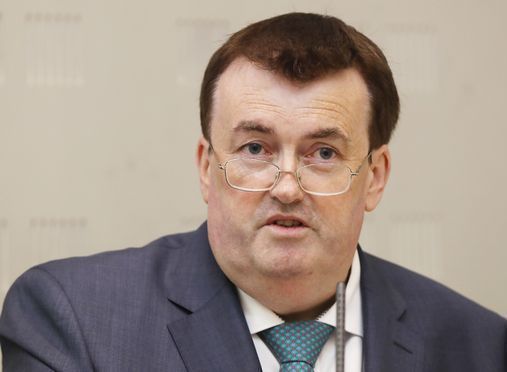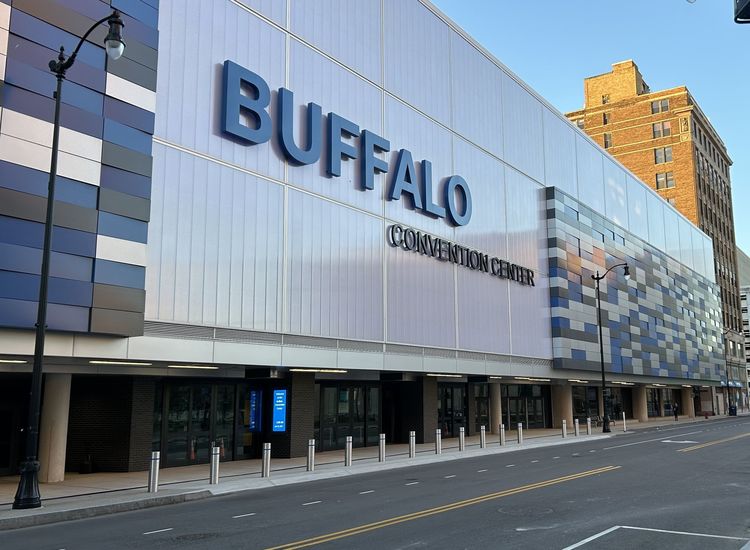This is an edited text of a statement from the Irish government's Minister of State for the Diaspora Colm Brophy announcing details of the planned Global Irish Civic Forum which will take place in Dublin in April, 2023
I am delighted to announce that the next Global Irish Civic Forum will take place in Dublin in April 2023.
It will be the third such forum, building on the great work done at the two previous iterations in 2015 and 2017.
These gatherings are first and foremost about connections. It is an opportunity for Government to connect in-person with its diaspora partners. It is an opportunity for Irish community organisations from all over the world to connect with each other. We would have met earlier but for the intervention of Covid.
The intervening five years have certainly been interesting and we have much to discuss.
The agenda has yet to be finalised but amongst the issues that are likely to feature are: implementing the Government’s Diaspora Strategy, 2020-2025; extension of voting rights; the Emigrant Support Programme; enhanced supports for returning emigrants; youth engagement legacy of Covid;
diaspora networks in the USA and Great Britain.
The question of participation of overseas citizens in our democracy will be a particularly important agenda item.
The current Programme for Government contains a commitment to hold a referendum on extending the franchise in presidential elections to citizens resident outside the state. The Diaspora Strategy re-states that commitment. Progress has been made but there is more work to be done.
I want 2023 to be a year when we stimulate and really advance public debate on a referendum to extend voting rights to our diaspora. This Forum will be an important point on our journey as we build a pathway towards this referendum.
You are all familiar with the background but I think it would be helpful at this juncture to recall briefly the progress we have made so far:
Extending the franchise in Presidential elections to Irish citizens resident outside the State was recommended in the Fifth Report of the Convention on the Constitution, 2013.
This was accepted by the Government in March 2017.
The 2017 Global Irish Civic Forum recommended that the right to vote should be extended to all citizens and this was endorsed by the then Government.
In September 2019, the Bill was initiated in Dáil Éireann by the Minister for Foreign Affairs. This Bill lapsed with the dissolution of the 32nd Dáil on 14 January 2020.
In July 2020, in accordance with a commitment in the new Programme for Government, the Bill was reintroduced to the Order Paper of the 33rd Dáil.
The Bill is currently before Dáil Éireann, Second Stage.
The date for the holding of the referendum will be decided once that legislation has been enacted.
This Civic Forum, this assembly of diaspora representatives, is the ideal forum for us to discuss this issue. I want us to emerge from the forum with a very clear, shared sense of what needs to be done to prepare the ground for a referendum.
As in previous years, the Forum will take place in Dublin, over two days, with both plenary and break-out sessions, so there will be ample time to get through what will be a full agenda.
I am speaking to you today from Iveagh House, the headquarters of the Department of Foreign Affairs, where I have the honour to serve as Minister of State for Overseas Development and Diaspora. On the diaspora side, I have really enjoyed interacting with Irish communities all over the world.
Just last month, I visited the UK - London and Liverpool - and the US - Dallas and Chicago.
From the Irish Centre in Liverpool to the Irish American Heritage Centre in Chicago, to name just two, I got a real sense, not just of the organisations, but also of the communities they serve. I also attended the Association of Irish & Celtic Festivals annual conference in Dallas.
It was a great opportunity to connect in one place with so many people from so many organisations from all across the United States.
I am very conscious of the great responsibility with which I have been entrusted, to nurture Ireland’s relationship with its diaspora. It is a relationship and a connection which we hold dear. And so we should, with a history of emigration that goes to the very heart of what we are.
It has been estimated that, since the 1800s, some ten million people have emigrated from the island of Ireland. In that great movement of people, there has been much sorrow and separation. There has also, however, been much opportunity and new beginnings. And the legacy of those new beginnings is today’s thriving global Irish community.
It is a community which has made its mark all over the world, and continues to do so today. It does so while retaining a great fondness for and connection to Ireland, to the home place. It is a relationship and a connection that is not static. It evolves and changes as circumstances dictate and is all the healthier for that.
The Covid experience was hard for us all and particularly for those separated from family and friends. In terms of our relationship with our diaspora, however, there were positive aspects to it. It marked another point of evolution of the relationship, with the Government reacting to the needs of Irish communities overseas.
As the scale of the impact of the pandemic on our diaspora communities became clear, the Government established a dedicated Covid-19 response fund for Irish communities abroad. We were in a position to react to the new circumstance by virtue of our existing relationships and partnerships.
It demonstrated to me the real value of successive Irish governments’ sustained investment in community organisations and networks since 2004.
The fund responded to cases of hardship, in particular in Britain, due to the aging Irish community.
It also responded to needs in the United States, where many people remain undocumented and therefore were unable to access support services for Covid-19. A total of €1.35 million was allocated to 100 projects with a focus on the main emigration centres.
None of this would have been possible without your support. We owe you a great debt of thanks.
The Covid experience does not define us, however. Our diaspora engagement work continued, even in the shadow of Covid. In November 2020 we launched Global Ireland: Ireland’s Diaspora Strategy 2020-2025. It was another watershed in the evolution of the relationship and the connection between Ireland and its diaspora.
That strategy was born out of the need to sustain and renew a meaningful connection with our diaspora.
It frames the work that we are doing to enhance our relationship with the diaspora and commits us to action in a number of key areas. We have made good progress. We are assisting Irish entrepreneurs returning home through the Back for Business programme.
We have established St. Brigid’s Day as a celebration of the talent and creativity of Irish women. We are deepening our connection with people for whom Irish heritage is more distant. We have increased our outreach to traditionally under-represented groups. We continue to support Irish cultural associations and festivals worldwide. We continue to work with the GAA to promote our Gaelic games.
The Strategy acknowledges the importance of the Emigrant Support Programme, which remains at the heart of our work with diaspora communities, and which prioritises initiatives which build on the pillars of the Strategy.
The Strategy also recognised the need to heal the relationship with our emigrants who left Ireland in crisis as a result of discrimination or as victims of institutional abuse.
As Minister for the Diaspora, I have been determined to build on and give practical effect to that recognition. I have been working closely with colleagues across Government to ensure the needs of those survivors living outside Ireland are addressed.
Their needs must be reflected in a flexible implementation of the Government Action Plan for Survivors and Former Residents of Mother and Baby and County Home Institutions.
Through our Embassies and Consulates, we will continue to work closely with the Department of Children, Equality, Disability, Integration and Youth to communicate back to those survivors and to their representatives living abroad.
It has been a particular priority for me to ensure that those living outside Ireland have a dedicated point of contact. I was particularly pleased, then, that last week the Government approved the appointment of a Special Advocate for Survivors.
The Special Advocate’s role will be to represent the collective interests of those who suffered institutional abuse. This will ensure that their views will inform the delivery of measures as set out in the Government’s Action Plan.
A key part of the Advocate’s engagement will be working with our Embassies and Consulates abroad to ensure that the needs of those abroad are reflected. In addition, the Special Advocate will be supported by an Advisory Council, which will have specific representation for survivors living outside Ireland.
This is a particularly difficult time for survivors and for many of you who work with the survivor community abroad. I would like to thank you for the dedicated support you provide.
I have made additional funding available from the Emigrant Support Programme for organisations working with overseas survivors. This will include funding for additional outreach workers to ensure survivors are supported at this difficult time.
In other areas of the Diaspora Strategy, the Covid experience has inevitably slowed our progress.
We still have work to do over the remaining three years of the Strategy in areas such as: enhanced digital connections; addressing barriers to returning to Ireland; working with local authorities on their diaspora policies; and streamlining ESP application and reporting procedures.
This Civic Forum will be a platform for discussion and debate. It will also be a springboard for implementing the remainder of the Government’s Diaspora Strategy.
Most of all, however, it will be about connection, conversation and creative thinking.








